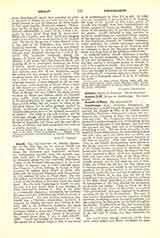

Amalricians (Lat., Almarici, Amauriani), an heretical sect founded towards the end of the twelfth century, by Amaury de Berle or de Chartres (Lat., Almaricus, Amalricus, Amauricus), a cleric and professor in the University of Paris, who died between 1204 and 1207. The Amalricians, like their founder, professed a species of pantheism, maintaining, as the fundamental principle of their system, that God and the universe are one; that God is everything and everything is God. This led them, naturally, to the denial of Transubstantiation, the confounding of good and evil—since good and sinful acts, so called, are equally of God—and to the consequent rejection of the laws of morality. They held, besides, peculiar views on the Trinity, distinguishing three periods in the Divine economy with regard to man; the reign of the Father, become incarnate in Abraham, which lasted until the coming of Christ; the reign of the Son, become incarnate in Mary, which had endured until their own time; and the reign of the Holy Ghost, which, taking its beginning from the dawn of the twelfth century, was to last until the end of time. Unlike the Father and the Son, the Holy Ghost was to become incarnate, not merely in one individual of mankind, but in every member of the human race. Moreover, as the Old Law had lost its efficacy at the coming of Christ, so, in their day, the law of the Gospel was to be supplanted by the interior guidance of the Holy Ghost, indwelling in each human soul. In consequence of this they rejected the sacraments as obsolete and useless. Those in whom the Holy Spirit had already taken up His abode were called “the spiritualized”, and were supposed to be already enjoying the life of the Resurrection. The signs of this interior illumination were the rejection of faith and hope, as tending to keep the soul in darkness, and the acceptance, in their place, of the light of positive knowledge. It followed from this, that in knowledge and the acquisition of new truths consisted their paradise; While ignorance; which meant adherence to the old order of things, was their substitute for hell.
The Amalricians, though including within their ranks many priests and clerics, succeeded for some time in propagating their errors without being detected by the ecclesiastical authorities. At length, through the efforts of Peter, Bishop of Paris, and the Chevalier Guerin, an adviser of the king, to both of whom secret information of the affair had been given, the inner workings of the sect were laid bare, and the principals and proselytes were arrested. In the year 1210 a council of bishops and doctors of the University of Paris assembled to take measures for the punishment of the offenders. The ignorant converts, including many women, were pardoned. Of the principals, four were condemned to imprisonment for life. Ten others, priests and clerics, who had obstinately refused to retract their errors, after being publicly degraded, were delivered to the secular authority and suffered the penalty of death by fire. Five years later (1215) the writings of Aristotle, which had been distorted by the sectaries in support of their heresy, were forbidden to be read either in public or in private. Regarding the scope of this prohibition see University of Paris.
Amaury himself, though dead some years, did not escape the penalty of his heresy. Besides being included in the condemnation of his disciples, in the council of 1210 special sentence of excommunication was pronounced against him, and his bones were exhumed from their resting-place and cast into unconsecrated ground. His doctrine was again condemned by Pope Innocent III in the Fourth Lateran Council (1215) “as insanity rather than heresy”, and Pope Honorius III condemned (1225) the work of Scotus Erigena, “De Divisione Nature“, from which Amaury was supposed to have derived the beginnings of his heresy.
JOHN J. A’ BECKET

